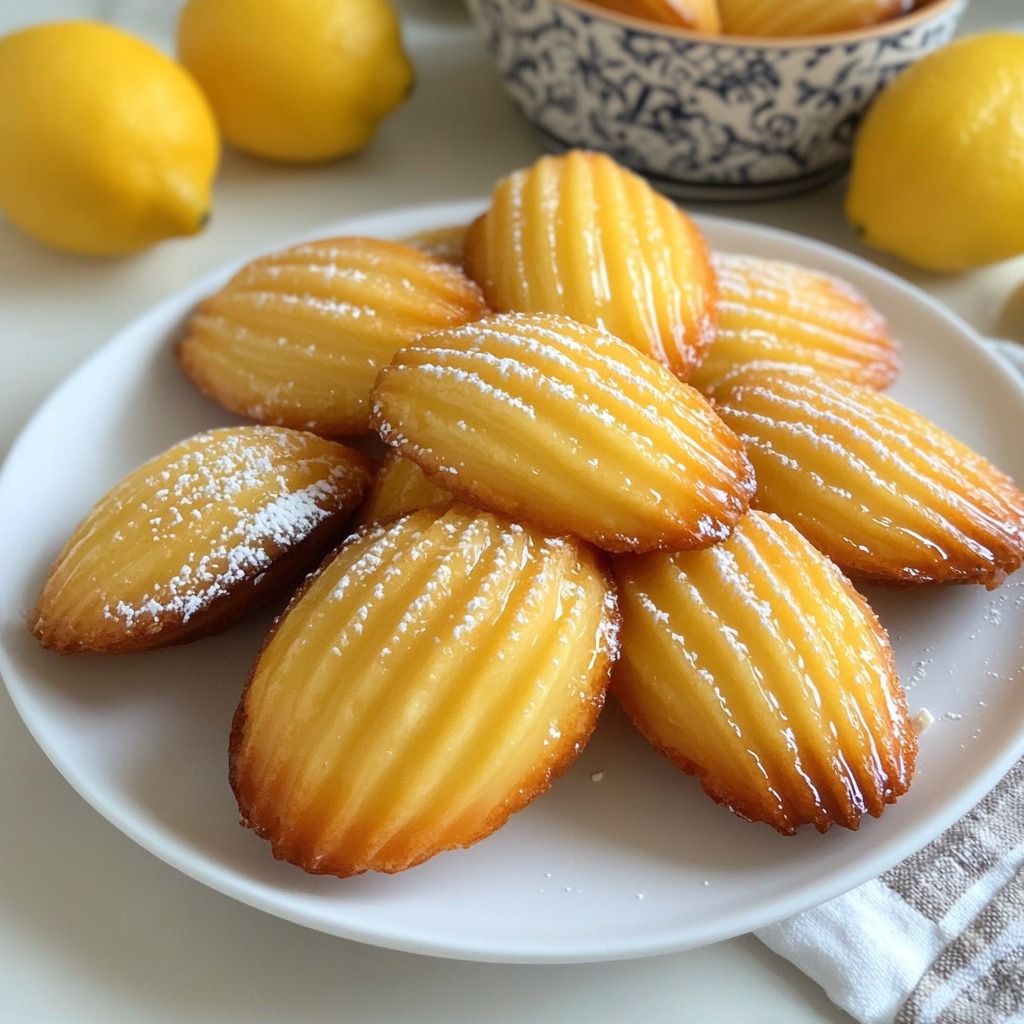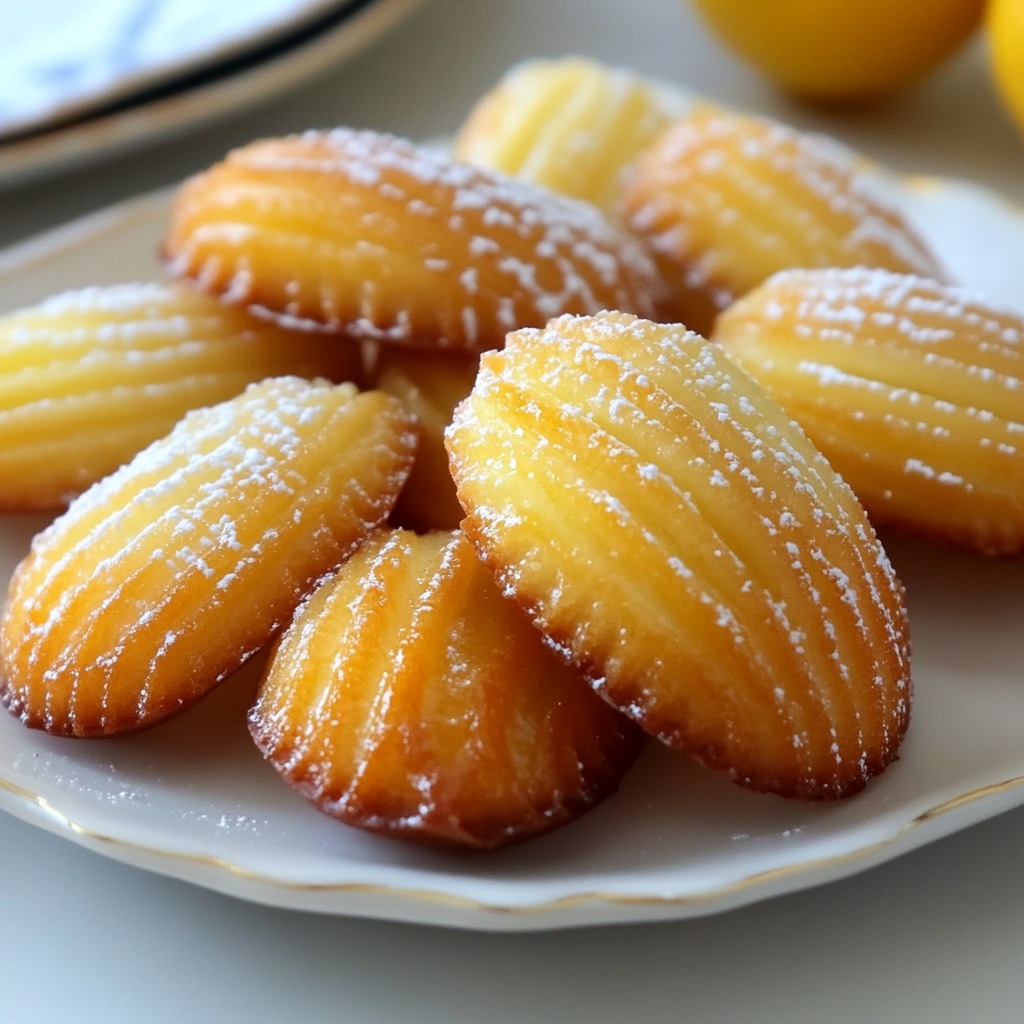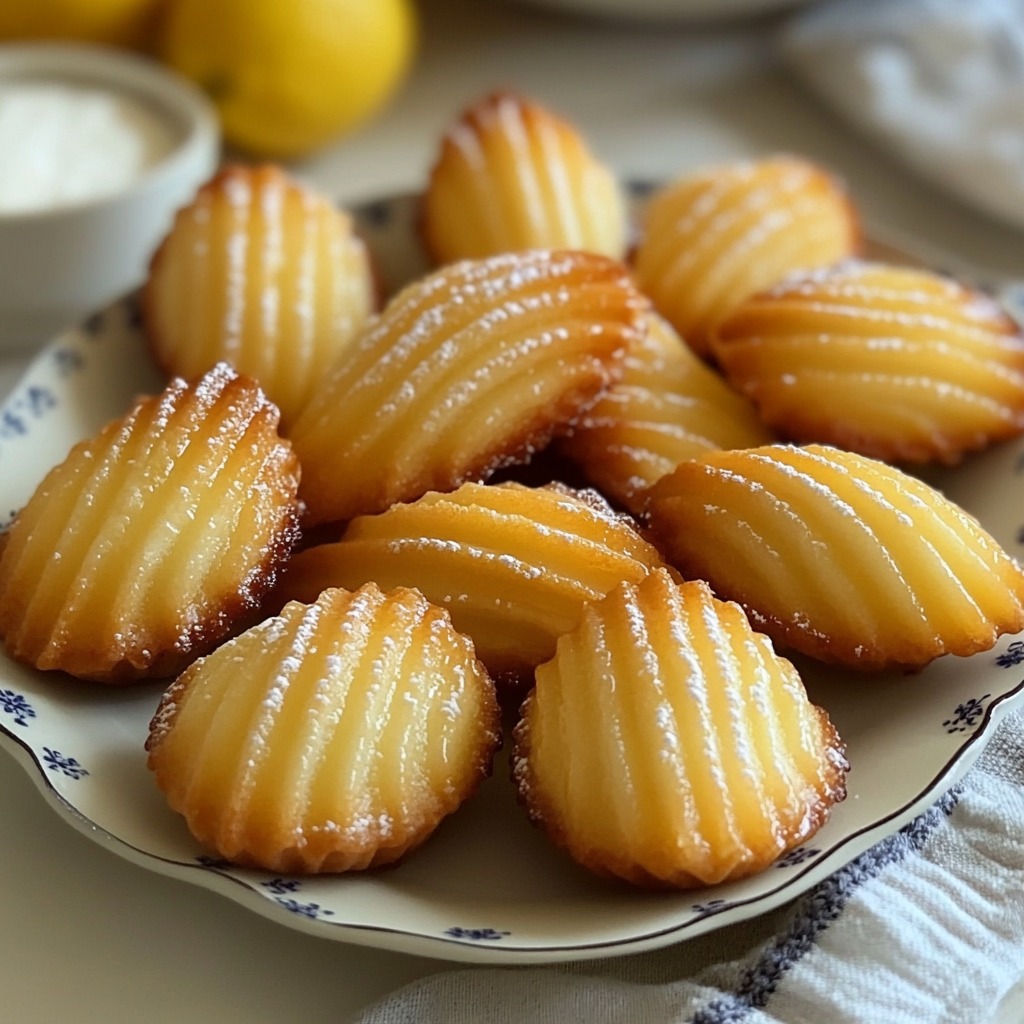 Pin it
Pin it
This classic French lemon madeleine recipe delivers delicate sea shell-shaped cakes with a perfect balance of sweet buttery flavor and refreshing citrus. The light lemony glaze adds just the right amount of moisture and tang to these traditional tea cakes.
I first learned to make madeleines during a cooking class in Paris. The teacher insisted on properly chilling the batter before baking, a step I initially thought unnecessary but discovered makes all the difference in achieving that distinctive bump on the back of each cake.
Ingredients
- Unsalted butter: Provides rich flavor and helps create the characteristic crisp edges. Always use high-quality European butter if possible for the best flavor.
- All-purpose flour: Gives the madeleines their delicate structure.
- Granulated sugar: Sweetens without overwhelming the other flavors.
- Large eggs: Provide structure and richness. Room temperature eggs incorporate better.
- Lemon zest: Adds bright citrus notes. Use organic lemons and zest only the yellow part for best flavor.
- Whole milk: Adds moisture and tenderness. Full-fat is best here.
- Vanilla extract: Enhances the overall flavor profile.
- Baking powder: Creates that signature bump on the back of the madeleines.
- Salt: Balances the sweetness and enhances all flavors.
- Powdered sugar: Makes a smooth glaze that sets beautifully.
- Fresh lemon juice: Adds tang to the glaze and intensifies the lemon flavor.
Step-by-Step Instructions
- Prepare the Batter:
- Whisking eggs and sugar until pale and thick creates air pockets that help produce light madeleines. This step takes about 3-4 minutes by hand or 2 minutes with an electric mixer. The mixture should form ribbons when the whisk is lifted.
- Incorporate Wet Ingredients:
- When adding the melted butter, ensure it has cooled slightly to prevent cooking the eggs. The lemon zest should be very finely grated to distribute evenly throughout the batter. Stir just until combined to maintain the air you've incorporated.
- Add Dry Ingredients:
- Whisking the flour, baking powder, and salt separately ensures even distribution of leavening. When folding these dry ingredients into the wet mixture, use a gentle hand with a rubber spatula, cutting through the center and folding over the sides just until no dry streaks remain.
- Rest the Batter:
- This step may not be in the original recipe but is crucial. Cover the batter and refrigerate for at least 1 hour or up to overnight. This resting period allows the gluten to relax and the flour to fully hydrate, resulting in more tender madeleines with better rise.
- Bake to Perfection:
- Fill madeleine molds only three-quarters full to allow room for rising. The characteristic bump forms best when cold batter hits a hot oven, so preheat thoroughly. Watch carefully during baking as they quickly go from golden to overdone.
- Glaze While Warm:
- The lemon glaze adds moisture and intensifies the citrus flavor. Apply while madeleines are still slightly warm for the glaze to partially absorb into the cakes. For a thicker coating, double-dip after the first layer sets.
 Pin it
Pin it
My grandmother always said a proper madeleine should have a pronounced bump on its back. She taught me to tap the pan firmly on the counter before baking to remove any large air bubbles, then immediately place it in the hot oven to create that perfect rise.
The Secret to Perfect Madeleines
The most important technique for classic madeleines is proper pan preparation. Brush every ridge of your madeleine pan with melted butter, then dust lightly with flour, tapping out excess. This creates a thin barrier that allows the batter to climb the ridges while baking, forming those distinctive shell patterns with crisp edges. Some bakers even chill their prepared pans before filling with batter for an extra temperature contrast that promotes the characteristic bump.
Creative Variations
While this lemon version is traditional, madeleines welcome many flavor adaptations. Try adding orange or lime zest instead of lemon, or incorporate a teaspoon of culinary lavender or rose water for floral notes. For chocolate lovers, replace two tablespoons of flour with cocoa powder. During holiday seasons, a pinch of cardamom or cinnamon transforms these into festive treats. My personal favorite variation involves folding in a tablespoon of finely chopped fresh herbs like thyme or rosemary for a sophisticated sweet-savory balance.
 Pin it
Pin it
Serving Suggestions
Madeleines shine brightest when served slightly warm, about 10-15 minutes after glazing. Pair with afternoon tea, especially Earl Grey whose bergamot notes complement the lemon beautifully. For dessert, serve alongside fresh berries and whipped cream, or create an elegant ice cream sandwich by placing a small scoop between two madeleines. They also make charming gifts when packaged in parchment-lined boxes tied with ribbon, though they should be enjoyed within 24 hours for optimal texture.
Storage Tips
Madeleines are at their absolute best the day they're made, with their contrasting textures of crisp edges and tender centers. However, they can be stored in an airtight container at room temperature for up to 3 days. Place parchment paper between layers to prevent sticking. To refresh day-old madeleines, warm them in a 300°F oven for about 3 minutes. They can also be frozen unglazed for up to 1 month, then thawed at room temperature and glazed before serving.
Frequently Asked Questions
- → How do I ensure light and fluffy madeleines?
Whisk the eggs and sugar until thick and pale to incorporate air into the batter. Also, fold the dry ingredients gently to maintain its light texture.
- → Can I use a different citrus for the glaze?
Yes, you can substitute lemon with orange, lime, or even a mix for a unique twist on flavor.
- → Why do madeleines require special molds?
The distinctive shell shape of madeleines comes from their unique pans, which also help with even baking.
- → How do I store madeleines?
Store madeleines in an airtight container at room temperature for up to 3 days. For longer storage, freeze them without the glaze.
- → Can I prepare the batter ahead of time?
Yes, you can refrigerate madeleine batter for up to 24 hours before baking. This can also help enhance their texture.
